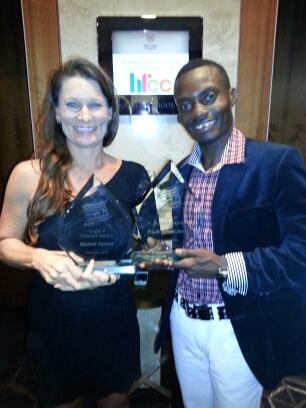The Triple P – Positive Parenting Program’s International Practice Award received a large number of high quality nominations. The award honours the work of leading accredited Triple P practitioners. This year, the committee eventually agreed on joint winners.

Frank Newah-Jarfoi, a liaison and community development worker for Centacare in south-west New South Wales, Australia, was honoured for his outstanding work delivering and promoting Triple P to culturally diverse families, particularly those of African heritage.
Michell Forster, an Indigenous liaison co-ordinator and family support worker, was nominated for her outstanding engagement of regional Queensland communities, her achievements in using Triple P to help reunify families whose children have been removed, and for her work in normalising parenting support for Indigenous families.
Mr Newah-Jarfoi said his award had inspired him to do more. “This program has greatly impacted the lives of family members in Wagga Wagga, especially those that have taken the refugee journey,’’ he said.
Ms Forster says she was driven to make a difference. “I truly believe that the skills and strategies that Triple P has to offer can help contribute to closing the gap,” said Michell. “We can help our children to grow up healthier physically, mentally, spiritually, socially. That’s got to be a positive thing.”
Also recognized for her valuable work was Anilena Mejia, of The University of Manchester, England, winner of the Triple P Early Career Research Award. Ms Mejia’s research examined the dissemination of Triple P into low resource settings in low and middle income countries, reporting on a series of empirical studies in Panama including surveys, measure validation, a randomised controlled trial and follow-up interviews.





